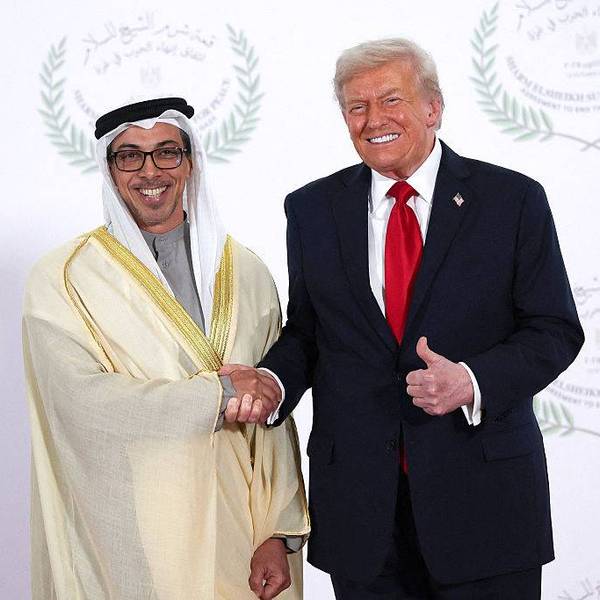President-elect Donald Trump's business dealings could represent "the most blatant conflicts of interest in the history of American politics," the president of Public Citizen said on Thursday, as more than a dozen groups called on Trump to sever ties with his "corporate empire."
A Trump attorney said last week that the real estate mogul plans to place his business holdings into a "blind trust" run by several of his adult children--an arrangement that raised many eyebrows.
"Mr. Trump's unprecedented secrecy and his extensive business dealings in foreign countries raise serious questions about how he intends to avoid conflicts of interest as president."
--Rep. Elijah Cummings (D-Md.)
Indeed, two former chief White House ethics lawyers wrote Tuesday of the plan: "This is the opposite of a blind trust. It is a demand that the American people blindly trust Trump and his family."
The 12 pro-democracy signatories to a letter (pdf) sent to Trump on Thursday raised similar concerns, declaring Trump's "duties to the American people now must prevail over your personal ties to the Trump Organization businesses."
"We are writing to urge you to place all of your business assets and investments into a genuine blind trust or the equivalent," wrote the groups and individuals, who include Common Cause, the Sunlight Foundation, and the ethics lawyers. "This means that control of these assets would be transferred to an independent trustee who would sell the assets and place the proceeds in investments which do not create conflicts of interest and which are not disclosed to you."
"Alternatively," the letter continued, "you could convert the Trump Organization businesses to cash and buy treasury bills and widely diversified mutual funds. These holdings are deemed conflict-free under federal law."
The letter further stipulates that if family members are to be involved with Trump Organization businesses, "a clear firewall must be established so that these family members have no involvement with policy decisions at the White House."
And while the signatories acknowledge that to do so might cause "personal discomfort," they firmly state: "Failure to follow this course of action will create conflicts of interest of unprecedented magnitude."
The New York Times delved into some of these potential conflicts of interest this week. "For instance," the paper wrote, "Mr. Trump will nominate the Treasury secretary, yet he owes hundreds of millions of dollars to banks, and he benefits from low interest rates set by the Federal Reserve, an institution he has criticized as political. The head of the Internal Revenue Service is also appointed by the president, and the agency is currently auditing Mr. Trump's taxes and sets tax policy that directly affects his businesses."
Pending labor disputes in Nevada and elsewhere also present a problem, the Times noted, given that "[t]he president appoints all five members of the National Labor Relations Board."
And Trump's foreign business holdings offer other complications.
"A close examination by Newsweek of the Trump Organization, including confidential interviews with business executives and some of its international partners, reveals an enterprise with deep ties to global financiers, foreign politicians, and even criminals, although there is no evidence the Trump Organization has engaged in any illegal activities," the magazine's Kurt Eichenwald wrote on Monday. "It also reveals a web of contractual entanglements that could not be just canceled. If Trump moves into the White House and his family continues to receive any benefit from the company, during or even after his presidency, almost every foreign policy decision he makes will raise serious conflicts of interest and ethical quagmires."
Speaking to Forbes on Tuesday, attorney and former deputy White House counsel under President Barack Obama Leslie Kiernan wondered: "What if the president had to decide whether to impose sanctions against a country in which his family held substantial real estate that would plummet in value if the sanctions were imposed?"
"The American people need to know that Trump is not running the government to benefit his own corporate empire."
--Robert Weissman, Public Citizen
"You do not want to hold financial interests that present a potential conflict of interest with your official duties," Kiernan said.
To that end, Rep. Elijah Cummings (D-Md.) this week wrote to House Oversight Committee chair Jason Chaffetz (R-Utah) demanding a probe into Trump's financial arrangements.
"We have never had a president like Mr. Trump in terms of his vast financial entanglements and his widespread business interests around the globe," Cummings said in a letter (pdf). "Mr. Trump's unprecedented secrecy and his extensive business dealings in foreign countries raise serious questions about how he intends to avoid conflicts of interest as president."
As Public Citizen president Robert Weissman said Thursday: "The American people need to know that Trump is not running the government to benefit his own corporate empire."



